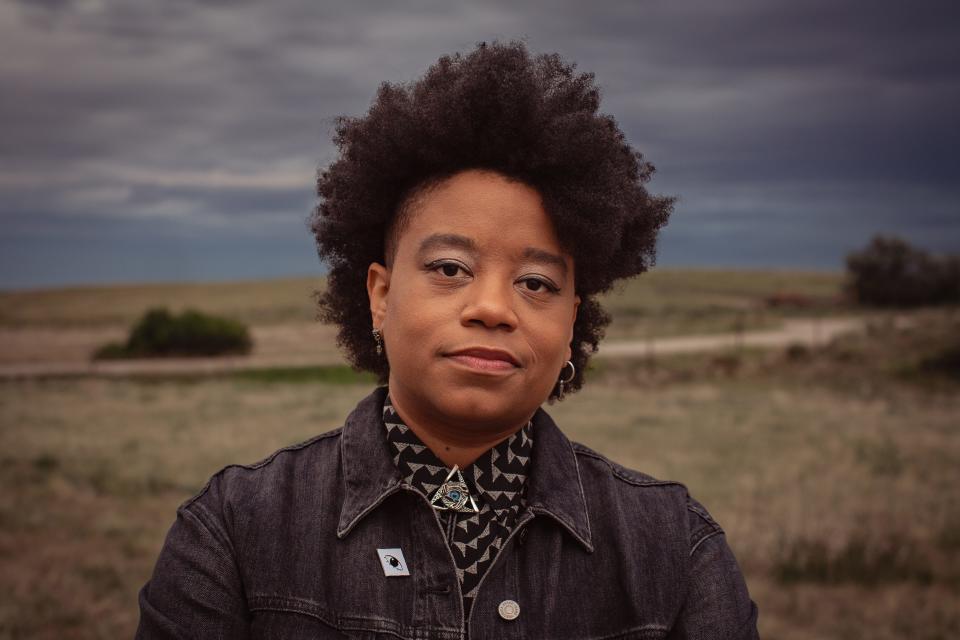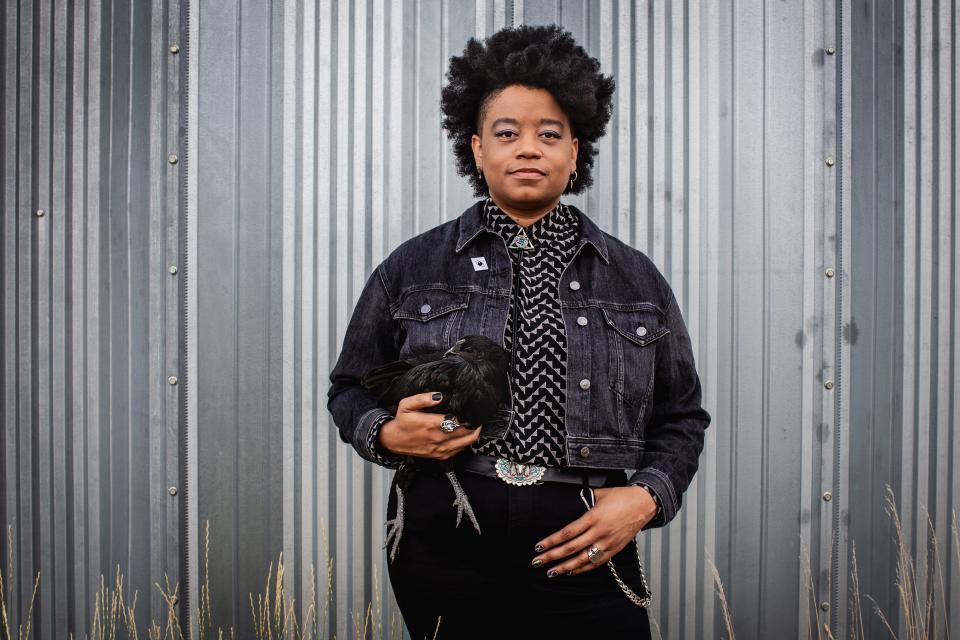Meeting Amythyst Kiah: That strength is yours now
- Oops!Something went wrong.Please try again later.
- Oops!Something went wrong.Please try again later.
“As I’ve grown older, I’ve learned that the world and the people in it are surprisingly interesting, and that the more you look and listen, the more interesting they become.” _ Nick Cave
There was a time, well before the Great Depression and World War II, when Blues music had nothing to do with the myth of Robert Johnson selling his soul to the devil at a forgotten crossroads in the Mississippi Delta. Quite the contrary. A hundred years ago, the Blues was the most popular dance music of the age, bigger than the Big Bands ever were. And the stars of the Blues were women. Black women.

They didn’t hop boxcars to get from place to place. They traveled in style in their own private Pullman coaches. And they didn’t dress like hobos. They wore hand-tailored dresses that sparkled like the Milky Way, draped with furs and feathers and everything fine.
I thought about that when I saw the “My Opry Debut” video of Amythyst Kiah’s first performance in the Circle, singing into that WSM microphone, in a sequined, tasseled, leopard skin pant suits. It was as if Porter Wagoner had grown up along the Gambia River.
Before she started singing, Amythyst just stood there, tall, strong, and silent. It made me think of Layla McCalla and Allison Russell’s song “You’re Not Alone.”
“In the cradle of the circle / All the ones that came before ya / Their strength is yours now / You are not alone.”
As if her physical presence wasn’t enough to put the Opry audience on notice that the axis of the Earth’s next revolution was not going to be like the one before she stepped out of the wings, the house band lit into “Black Myself,” Amythyst’s earth-shattering sing-along that is half history lesson and half dream of the future.
With lines like “I’m tired of walkin’ round with no shoes on” and “your precious God ain’t gonna bless me,” the song plunges you into the icy water of pains and depravities no Heaven can take away.
But in the song’s second half, she sings of a changed and changing world.
“I washed away my blood and tears / I’ve been born brand new / There’s no more work horses / But still some work to do.”
Black herself, and as Tennessee as can be, born in Chattanooga, living in Johnson City ... Amythyst Kiah has said she loves to hear white audiences sing along on “Black Myself.” It’s a transcendence most don’t realize they’re about to experience when the song begins. And you know, I just gotta say this ... I think that transcendence is possible only because Amythyst is from East Tennessee.
In just three weeks, every performer at the Big Ears Festival will be wishing they can be in the house to watch when Amythyst Kiah takes the stage at Jackson Terminal. When her voice makes the bricks shake, there will be attention up above too, from Ida Cox, Ma Rainey, Alberta Hunter, Sippy Wallace, Odetta, and Aretha. I can hear every one of the greats saying to anyone who’ll listen, “oooo, that girl can sing.”
When Amythyst Kiah sings Joy Division’s “Love Will Tear Us Apart” on her latest Rounder Records EP “Pensive Pop,” she isn’t sending a warning. She’s not making a prediction. She’s amplifying the sound of her heart being ripped from her chest. She is mapping the empty cavity left behind. And she is paying homage to the wrenching brevity (1976 – 1980) of a pioneering post punk band which screeched to a halt with the suicide of its point man Ian Curtis at age 23.
The irony of the title of Joy Division’s first recording, “An Ideal For Living,” is not lost on Amythyst Kiah, who had to come to terms as a teenager with the loss of her mother to that darkest of mysteries, a mystery she freezes in time and timelessness with her song “Wild Turkey,”
“...’cause she’s never comin’ back.”
To hear Kiah sing Bob Marley’s “Slave Driver” is to realize it is dance music, for a dance you would never survive with your soul intact.
“Slave Driver” is a 50-year-old song. “Darling Cora” is more than a hundred years old, and nobody can say definitively where it came from or who wrote it or who it’s about, but I remember hearing it before I was 10 years old on my father’s record player, in a bongo-driven art song version by Harry Belafonte, recorded live at Carnegie Hall.
In Amythyst Kiah’s version, “Darling Cora” is as brutal as its skeletal story, and as straightforward as her stripped-down, stepping-stone clawhammer banjo rhythm.
In a voice deeper than an unmarked hand-hewn grave in a nameless meadow, a voice that can fly up from that grave like the first bluebird you see in March, this song that’s older than memory becomes brand new. It becomes Amythyst Kiah’s.
And you may be walking across a pasture in Oliver Springs one day, or Strawberry Plains or at the base of Bluff Mountain, and the wind will stop all of a sudden, and a voice below your feet will call out, begging you to “get me up from this cold cold ground.”
And you’ll be hooked, by the most deeply traditional yet unprecedented voice to enrich the American peoples’ music in a long, long time.
That process, that possession of one artist’s intention by another who gets right to its heart, or the possession of a folk ballad‘s evolution by an artist who erases time, is itself a time-honored folk tradition. But in Amythyst’s hands, the possession is for keeps. Her performing domain is what the recording arts people call “roots music.” Folk, blues, zydeco, jazz, bluegrass ... it’s all roots music. But some roots run deeper than others.
Like Taj Mahal, Amythyst Kiah is in a class by herself, with roots that reach the center of the Earth, and when she sings and pleas and growls from the deep center of her chest, when she shakes the roots that keep her anchored, every branch of the whole damn family tree listens up. And lights up.
Amythyst Kiah has recharged the value of interpreting songs by other artists who live in realms a million miles from hers. And she has brought to bear everything she learned and thought in her East Tennessee State University (ETSU) traditional music studies to her interpretation of songs too old to be claimed by anyone, or any culture.
Amythyst Kiah’s original songs are, like her, in a class by themselves. Unfettered by expectations floated by her simply unbelievable voice, she is a song architect more than a songwriter. She doesn’t just write songs. She builds ‘em, and they’re built to last.
Every cut on Kiah’s album “Wary + Strange” puts this craft on display. “Hangover Blues.” “Fancy Drones / Fracture Me.” Just listen to the opening movements in these songs. You hear building blocks unlike any you’ve ever heard before, and they start stacking up for a foundation to hold whatever the architect chooses to follow with. It’s brilliant.
“I call architecture frozen music.” _ Johann Wolfgang von Goethe.
Amythyst’s original songs are straight from a young soul that’s been through a lot, looking for the way to tomorrow, and she’s building as fast as she can in a world where nothing is certain.
Then, along the way, the Grand Ole Opry says, “Hey Amythyst, you wanna come own our stage for a few minutes?”
And the Big Ears Festival says, “Hey Amythyst, do you want to own the Jackson Terminal for an hour in the midst of the most amazing music festival on the face of the planet?”

And Ms. Kiah says, “Hell yes.”
Thursday night, March 21, from 8 to 9:15 p.m. at Jackson Terminal on the western edge of the Old City, Big Ears history is going to be made, because Amythyst Kiah is carrying the world on her shoulders.
I love this singer’s power. She’s everything an artist should be. I hope she stops worrying about what anyone thinks about her private life. Who cares? It’s nobody’s business. Listen to Francine Reed singing “Wild Women Never Get the Blues” and be done with it. That’s Ida Cox talkin’.
John Job is a longtime Oak Ridge resident and frequent contributor to The Oak Ridger.

This article originally appeared on Oakridger: Meeting Amythyst Kiah: That strength is yours now

